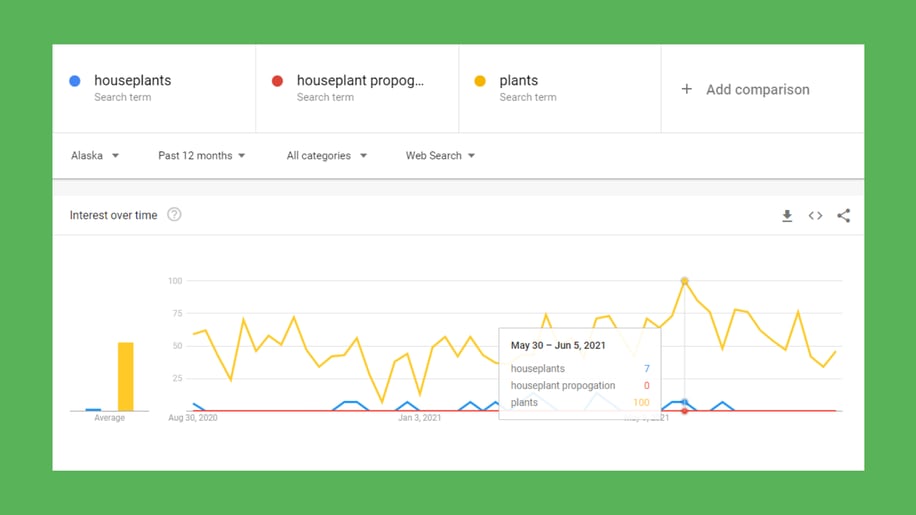SEO Strategy: Optimizing Your Keywords
On this page
(Last updated September 23, 2022)
Your prospects type specific words in a Google search when they're looking for the product or service you provide, yes?
So that they find your website (and not your competitor's), you should be using keywords in your website copy wherever it's relevant and valuable to do so.
As well, using relevant keywords optimizes your website so that your business shows up in Google rankings before your competitors.

Here are some basics of keyword optimization and how to get it done.
Start With Keyword Research
Keyword research is the act of gathering the keywords in your ideal customer’s query on Google. These words should reflect user intent as it relates to your brand, products, or services.
Keyword Planner tools can help you do this research and narrow the relevant keywords for your business.
Here are a few of the best free online tools for helping you determine the best keywords for your website:
- Google Keyword Planner - Google Ads helps you plan out your keywords to advertise active campaigns, but you can use it to find the best keywords even if you’re not setting up an ad right this minute.
- Google Search Console - With a little reverse engineering and this tool, you can see which search terms are leading people to visit your website. There might be search terms you didn’t expect that are proving useful to you, and you can make larger use of them in your content.
- Google Trends - Search and compare multiple keywords and filter by location, search history, and category. This tool will show you how much web interest there is around a particular keyword, what caused the interest, and where the traffic is coming from. It generates colorful, interactive graphs to download and embed on your website.
- Keyword Tool.io - This basic tool is helpful when you’re looking for metrics on long-tail keyword suggestions (phrases) that you may already have in mind, and you don’t have to create an account to use it. It uses Google Autocomplete to create a list for you that’s based on how often people searched for a term in the past.
It’s hard not to get distracted by trying to rank for specific keywords when you’re doing keyword research, but it’s equally important to focus on the search intent—keyword relevance—behind keywords. Let’s take a look at that.
Keyword Relevance
If a page on your website doesn’t provide an answer to a visitor's question, it won’t rank as well on Google because it probably lacks relevance to what your business does or provides. You can't just put keywords anywhere and expect that to drive traffic, especially in light of Google's Helpful Content Update that went into effect in early September 2022.
When you’re trying to determine the relevance of a specific keyword, ask yourself:
- What are the typical keywords my prospects use to find me (according to my keyword research)?
- How can I create content that best speaks to those keywords?
Website keywords should direct users to the valuable information on your website and vice versa.
Big Takeaway: If you create valuable, relevant content for your website that your ideal customers are looking for and need, you’re going to be using the right keywords in your copy. Don’t lose track of that in your process.

To find the relevance of a specific keyword, invest in an SEO tool like Ahrefs or SEMRush to do more in-depth research. These tools also analyze keyword difficulty: how hard it will be to compete with your competitor’s websites for the same keyword.
Or you could call us. We do this work in our sleep.
At the end of the day, the better your webpage answers a question, the better it will rank for a specific keyword.
Keyword Search Volume
Standing out from your competition is a real trick if thousands of people are vying for the top seat on Google’s rankings for your specific keywords.
Keyword search volume tells you how many users were searching for a specific keyword or phrase over the past month.
Understanding this metric can help you adjust your strategy for more efficiency and success.
If the search volume is high for your keyword, you’ll be competing with a lot of other websites for Google ranking, so you might use long-tail keywords rather than simple ones.
Long-tail keywords are 3-5 word phrases that add details that might be more relevant to your website content anyway.
Here's an example of this strategy that can be shown through a simple, free Google Trends query:
Simple Keyword with a high KSV: “plants”
v.
Long-tail keyword: “houseplants” or “houseplant propagation”

In May of 2021, people in the U.S. were super interested in plants.
If you have a small business that sells cuttings of popular houseplants for propagation, you would do best to choose long-tail keywords for your website so you don’t have to compete with large companies like Amazon and Walmart—and your real customers can find you more easily as well.
Keywords that are Already Working
Don’t forget to generate a list of keywords already driving traffic to your site because they represent the information your customers are looking for.
A list like that can show you the topics you need to create your blog or your website copy to boost your SEO significantly and further leverage your search success.
Our DevTeam at Growth has decades of experience with keyword research and optimization as evidenced by the fact that you’re reading this right this minute.
Intrigued? Contact us to talk about it. We're right here.
Explore More Insights: Related Blog Posts
-
 Inbound MarketingDec 15, 2020
Inbound MarketingDec 15, 2020 Ashley Lilly
Ashley LillyEngaging Content: How It Brings Value to Your Business
(last updated May 4, 2022) If you’ve been asking yourself if engaging content is valuable for your business,...
-
 Inbound MarketingDec 2, 2021
Inbound MarketingDec 2, 2021 Growth Marketing Firm
Growth Marketing FirmTop 8 Benefits of High-Quality, Consistent Content Marketing
Content marketing is a long game, but well worth the effort because it's by far one of the most effective...
-
 Inbound MarketingDec 18, 2020
Inbound MarketingDec 18, 2020 Ashley Lilly
Ashley LillyAre you Utilizing Google My Business to its Full Potential?
There are so many ways to increase awareness for your brand, business, or company. But when it comes to your...
-
 Inbound MarketingSep 16, 2021
Inbound MarketingSep 16, 2021 Growth Marketing Firm
Growth Marketing FirmHow to Define & Write a Business Value Proposition
(last updated April 6, 2022) A value proposition is one of the most important sentences you'll ever write for...
-
 Inbound MarketingApr 13, 2021
Inbound MarketingApr 13, 2021 Ashley Lilly
Ashley LillyIs Your Business on Yelp?
Did you know Yelp averages more than 178 million unique visitors every month across its mobile, desktop, and...
-
 Inbound MarketingJun 18, 2020
Inbound MarketingJun 18, 2020 Growth Marketing Firm
Growth Marketing FirmRanking Time: What Matters to Google
Did you know that more than 3.5 billion searches are made every day on Google and that it holds over 85% of...
-
 Inbound MarketingAug 24, 2021
Inbound MarketingAug 24, 2021 Growth Marketing Firm
Growth Marketing FirmThe Secret to Writing Effective Inbound Blog Content
(last updated May 2, 2022)
-
 SEOJun 4, 2020
SEOJun 4, 2020 Ashley Lilly
Ashley LillyHow much does SEO cost?
Last Updated January 22, 2021 Everyone’s website needs SEO but how do you know how much to pay or who to...


